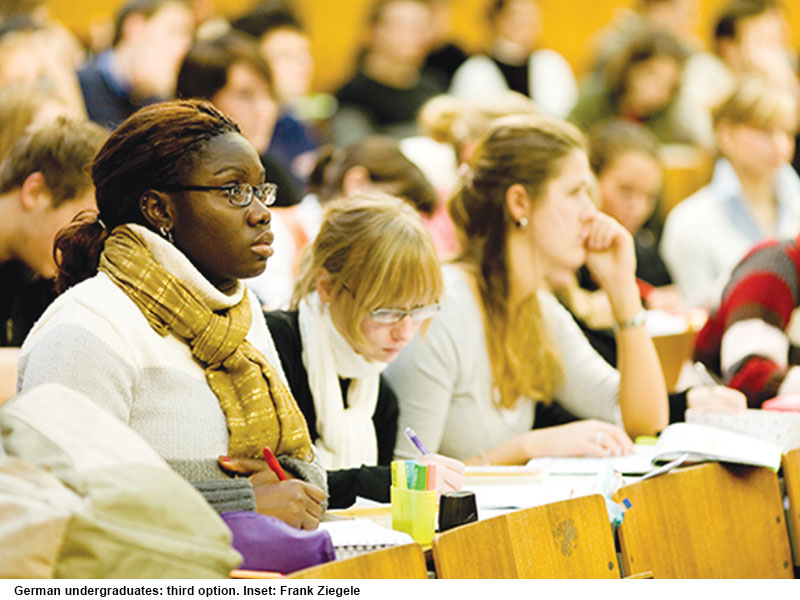
Students looking for part-time work are often caught between two less-than-ideal options. When they need extra money, they can take on low-skilled part-time work, such as stacking shelves in a supermarket or pulling pints in a bar. If they want professional experience, internships are preferred. But these are often unpaid, excluding all but the wealthy, and sometimes barely long enough to work out how to use the photocopier. German students, however, have a third option that advocates say combines the best of both worlds.
‘Work student’ positions have been offered by German companies since the 1920s and give undergraduates longterm experience in a firm alongside their studies — stints of a year are not uncommon — while often paying above minimum wage. “This system in Germany seems to be very special,” says Christian Schneickert, a sociologist at the University of Magdeburg who has studied the scheme.
An online search for work student positions yields thousands of results, offered by global consultancies, industrial titans and banks. The work itself might not be the most thrilling — doing income tax returns, writing sales reports, testing new IT tools — but it is several steps up from fetching coffee and may lead to a permanent job upon graduation, acting as a kind of extended interview.
The system is protected in law. Work students who labour for less than 20 hours a week, pay no health or unemployment insurance, meaning they keep most of their salaries, explains Frank Ziegele, director of Germany’s Centre for Higher Education (CHE). “The incentive for everyone involved is that it creates a win-win situation,” he says. “You can earn a living, but can do something that is tied to what you study.” Students commonly tackle questions pertinent to their employer in their bachelor’s or Masters thesis, he explains.
At CHE, work students are drafted on a project basis to relieve regular employees of, say, relatively routine numbers crunching. “We benefit from a rather cheap labour force,” Prof. Ziegele admits. But still, “it’s much better for your career than working in a bar,” he argues.
Not all employed German students enjoy work student positions. Like in other countries, they also toil in bars, cafes and factories in positions open to anyone. But the system is so well-established that almost a third of those employed have the equivalent of a work student position in universities and research organisations (the number in private companies is unclear).
Still, there are low rumbles of concern about social fairness. Students who win such positions in universities are more likely to come from highly educated families, according to a spokeswoman of the German Centre for Higher Education Research and Science Studies. In some cases, the system is a “reproductive path for students from the higher classes”, admits Schneickert, although he stresses it is still fairer than unpaid internships.
But the pandemic has really brought the weaknesses of Germany’s student job system into painful focus. Perhaps surprisingly for a wealthy social democracy, in Germany students rely heavily on their jobs and parents, but less so on the state (although they pay next to no tuition fees).
More than a quarter of students’ income comes from their own earnings, according to the most recent data from 2016, up four percentage points from 2012. Nearly seven of 10 students work while studying. Meanwhile, more than half their income comes from parents.
There is now deep worry about how many students have lost their jobs, says Stefan Grob, spokesman for the Deutsches Studentenwerk, a countrywide network of student service organisations. One survey suggests that the figure could be as high as 40 percent. The anguish from student groups has grown so loud that in June, the government introduced emergency grants for those down to a few hundred euros in their account. So far, there have been 150,000 applications for this bridging aid in June and July, says Grob, whose organisation runs the scheme.
This is on top of an earlier scheme that dishes out loans of €650 (Rs.55,939) per month, raising worries of rising student indebtedness. None of these emergency measures is enough, argues Grob. The pandemic has merely exposed the idea of adequate state support for students as a “fiction”. But there is still no “visionary strategy about student financing in Germany”, he warns.



























